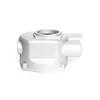Mobile:+86-311-808-126-83
Email:info@ydcastings.com
An Overview of Aluminum Pressure Casting Techniques and Their Applications in Modern Manufacturing
The Advantages of Aluminium Pressure Casting
Aluminium pressure casting is a highly efficient and versatile manufacturing process that has gained popularity across various industries due to its numerous advantages. This method involves forcing molten aluminium into a mold under high pressure, allowing for the production of complex and intricate parts with excellent surface finishes and dimensional accuracy. As industries continue to seek lightweight and durable materials, aluminium pressure casting emerges as a top choice.
One of the primary benefits of aluminium pressure casting is its ability to produce components with outstanding mechanical properties. Aluminium alloys used in this process often exhibit excellent strength-to-weight ratios, making them ideal for applications in automotive, aerospace, and electronics industries. Lightweight components can improve fuel efficiency in vehicles, while maintaining structural integrity and safety standards. As the demand for lighter materials grows, aluminium pressure casting provides a solution that meets these needs without sacrificing quality.
Furthermore, the pressure casting process allows for the creation of intricate designs that would be challenging or impossible to achieve through traditional casting methods. The high pressure used in the process forces the molten aluminium into every corner of the mold, capturing fine details and complex geometries. This capability is especially valuable in industries such as automotive manufacturing, where components like engine blocks, gear housings, and other intricate parts are often required. The precision achieved in pressure casting minimizes the need for extensive machining, resulting in reduced production times and lower costs.
aluminium pressure casting

Another significant advantage of aluminium pressure casting is its efficiency in terms of material usage. The process generates minimal waste since the molten aluminium is quickly injected into the mold, allowing for near-net shape production. This means that there is less excess material to be trimmed away, thus lowering material costs and increasing overall sustainability. As industries look to reduce their environmental footprint, efficient material usage becomes an important factor in manufacturing processes.
Aluminium pressure casting also offers excellent surface finish characteristics. Unlike other casting processes, parts produced through pressure casting typically require less post-processing work, such as sanding or polishing. The high-speed injection process leads to smooth surfaces that often meet the required visual and functional specifications straight out of the mold. This is particularly beneficial in industries where aesthetic appearance is critical, such as in consumer electronics and automotive interiors.
Moreover, the versatility of aluminium pressure casting cannot be overstated. The process can accommodate a wide range of aluminium alloys, which can be tailored to specific applications. Different alloy compositions can provide varying properties, such as increased corrosion resistance, enhanced thermal conductivity, or improved machinability. This adaptability makes aluminium pressure casting suitable for a wide range of industries, from automotive to aerospace, consumer goods, and medical devices.
In conclusion, aluminium pressure casting is an advanced manufacturing process that offers numerous advantages, including exceptional mechanical properties, the ability to create intricate designs, efficient material usage, and superior surface finishes. As industries continue to demand lighter, stronger, and more complex components, aluminium pressure casting stands out as a viable solution that not only addresses these requirements but also promotes sustainability. With ongoing advancements in technology and materials, the future of aluminium pressure casting looks promising, paving the way for even more innovative applications in various sectors.
-
What Makes Stainless Steel Pump Casting Essential for Modern Industries?NewsJul.14,2025
-
Revolutionize Your Engine Maintenance with Premium Aluminum and Cast Iron ComponentsNewsJul.14,2025
-
Precision Flow Engineering Starts with the Right Pump ComponentsNewsJul.14,2025
-
Maximize Efficiency: Explore Reliable Containment and Crop SolutionsNewsJul.14,2025
-
Discover Superior Performance with Advanced Turbo ComponentsNewsJul.14,2025
-
Boost Fluid Dynamics with Precision-Engineered Pump ComponentsNewsJul.14,2025











